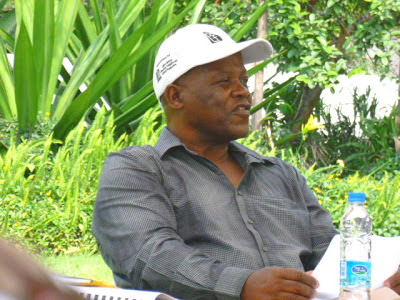
About twenty authors and poets met in
Harare at the British Council on Saturday, October 27, to scrutinize the COPAC
draft constitution that has reached a decisive moment in Zimbabwe. The writers
sought to find what the draft constitution says regarding different aspects of
their jobs as well as their lives as citizens of this country.
Running under the topic “Unpacking the
COPAC Draft Constitution for writers and artists”, the meeting was chaired by
David Mungoshi and was more of a conversation between the writers and two
panelists Dr. Petina Gappah (who replaced writer Alexander Kanengoni) and Prof
Lovemore Madhuku.
Gappah, speaking as a writer and lawyer,
emphasized writers are citizens first of all and therefore are affected by every
aspect of the draft constitution although there are clauses that directly
impact upon their work.
She gave examples of the right to freedom
of expression and artistic creation, the right to academic freedom, right to
access to information and the right to language and culture, all of which heavily impact upon the writers' work.
Language is now recognized broadly in the
draft with sixteen languages now qualifying as official languages of Zimbabwe.
Gappah said this is an important clause
to have in any constitution.
“Until two years ago, the children of
Victoria Falls could not learn their mother language (Tonga) at school. Tonga
was not a language of instruction in Zimbabwe. For the first time, two years
ago Tonga children could sit for exams in their own language. This is what I
appreciate as a writer,” said Gappah.
South Africa is also one of the African
countries that have given official status to every language spoken in that
country.
Turning to Prof Madhuku, Gappah asked how
a constitution is supposed to be made and the models of constitution-making
that have been used around the world.
“There is no formula for writing a
constitution,” said Prof Madhuku. “Different societies have different methods
but the process chosen must be legitimate.”
He also said legitimacy is acceptability
in the sense that if a society accepts a particular way of doing things, then
it can be done.
Referring to the COPAC draft
constitution, Prof Madhuku said there was a time when it had some legitimacy
and then at some point lost its legitimacy when COPAC became arrogantly
exclusive.
“Some of the things in the draft are good
but it’s unlikely that you will get everything in a constitution good or bad,”
he said.
Reflecting on the 2000 draft constitution
which people rejected, Prof Madhuku noted that there were good things in that
draft and also bad things.
As for the COPAC draft, he said there are
good clauses in it such as the Bill of Rights which recognizes most rights that
people want.
However, he said it is only left to
people to weigh the draft.
An open discussion followed in which writers spoke about other issues in light of the
draft constitution such as homosexuality and culture, death penalty, women
rights, executive powers and the referendum.
On culture and matters of advancement of
women, Gappah said that there is now better clarity in the draft constitution.
She said cultural practice which is
inconsistent with the dignity of women as equal beings is now clarified in the
draft and this coincidentally comes at a time when she is tackling the practice
of ngozi in her next book.
Later, writer Shimmer Chinodya gave the vote of
thanks in which he said writers in attendance have been lucky to have this
opportunity to critically look at the national document that one way or the
other shapes their futures.
The writers’ meeting was organized by
Zimbabwe Writers Association which, through its Chairperson Musaemura Zimunya,
also took this opportunity to update its members on its recent outreach visit
to Manicaland.
Below
are pictures from the writers’ meeting
(All
photos by WIN)
Prof. Madhuku
Petina Gappah
Shimmer Chinodya who gave the vote of thanks
David Mungoshi who chaired the writers' meeting
Prof Madhuku
Musaemura Zimunya, ZWA Chairperson
****************
WIN
"Unclipping wings of the imagination"
*****************














No comments:
Post a Comment